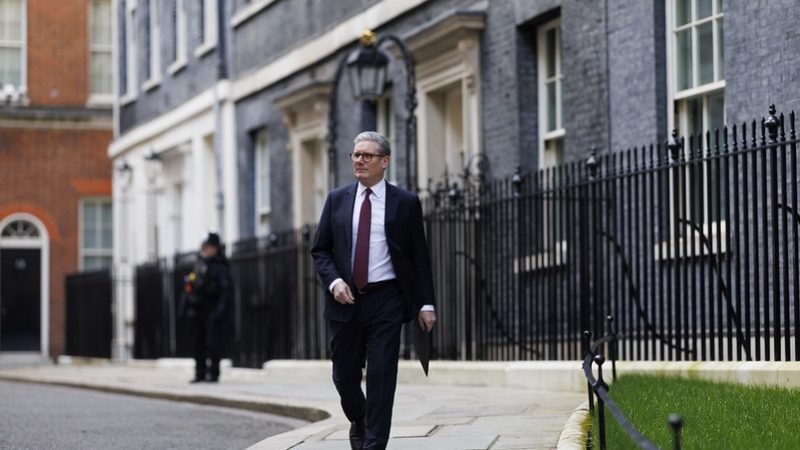
Donald Trump seems to have given the Keir Starmer administration a sense of direction and a governing narrative that was so dramatically missing from its first six months.
This not a sentence that I expected to write as I tucked into my Turkey left-overs, reflecting on how Labour’s Number 10 just didn’t appear to know how to do politics.
But the madman in DC and his shock and awe approach to global politics, global government and global economics has given Keir Starmer purpose where many – even supporters like me – were beginning to worry it was absent.
Be it in international leadership, in choosing defence spending over aid or in balancing the budget by cutting benefits, we see a clarity of decision-making that appears to suit Starmer, where previously none was present.
READ MORE: ‘Love it or loathe it, aid cuts and defence cash play well on the doorstep’
We saw it yesterday too in his speech in front of the Jaguar Land Rover production line that promised to reduce environmental targets and fines as a way of shoring up British manufacturing in the face of hideous tariffs.
It has become received wisdom that this set of decisions is a pivot to the right, representing the triumph of some kind of Morgan McSweeney-inspired Blue Labour pupulism. The progressives that make up the majority in our party are worried.
To some extent this characterisation is obviously correct. But I also think it misses something important – something that could ultimately serve both the Labour party and our democracy well in the months and years ahead.
There is a strong national urge to baton down the hatches
It is this. The Starmer project has correctly identified the biggest concern of the current era: Security. From national security to job security to border security to home security to financial security, voters are deeply concerned about a scary and insecure world.
It is there in yesterday’s speech (some variety of the word “security” came up 11 times) and it’s there in the latest government slogan: “Securing our future.”
It comes up time and again in focus groups. When you ask them what they want for their families, it is not wealth or holidays or bigger houses: it is safety and security. Ordinary British people currently find the world a very scary place.
There is a strong national urge to baton down the hatches. Economic growth and sunny uplands don’t resonate with people if they think the world as they understand it is collapsing around them.
Starmer’s speeches, both yesterday and in the last couple of months, have reflected that mood well. It is important to understand that this is not simply tacking to the populist right – rather, it’s trying to give a slightly frightened populace some form of reassurance. The tone, for example, of his announcement in the Commons about cutting aid could not have been more sober.
Security is everything
This change in direction reflects what ordinary people want from their leaders in this deeply destabilised world – indeed the polling in Canada and Australia for governing parties of the left point that way. There’s a reasonably good chance that Starmer’s difficult decisions will come to be respected by voters and his personal ratings might even start to reflect this.
This in itself doesn’t mean the next election is an open goal. Anything but. Reversing the direction of the polls for this government – especially in these uncertain times – will be a massive lift.
The many and manifold crises that have led the Starmer government to its new position are producing exceptionally challenging fiscal and economic headwinds. They will also almost inevitably increase the number of poor souls willing to risk it in a small boat in the Channel – a huge electoral challenge for the government.
But at least Labour has now established a frame and a narrative that gives it a fighting chance. With luck, voters will begin to understand that the PM is on their side. Security is everything.
For more from LabourList, subscribe to our daily newsletter roundup of all things Labour – and follow us on Bluesky, WhatsApp, Threads, X or Facebook .
- SHARE: If you have anything to share that we should be looking into or publishing about this story – or any other topic involving Labour– contact us (strictly anonymously if you wish) at [email protected].
- SUBSCRIBE: Sign up to LabourList’s morning email here for the best briefing on everything Labour, every weekday morning.
- DONATE: If you value our work, please chip in a few pounds a week and become one of our supporters, helping sustain and expand our coverage.
- PARTNER: If you or your organisation might be interested in partnering with us on sponsored events or projects, email [email protected].
- ADVERTISE: If your organisation would like to advertise or run sponsored pieces on LabourList‘s daily newsletter or website, contact our exclusive ad partners Total Politics at [email protected].





More from LabourList
Ashley Dalton resigns as health minister for cancer treatment
Paul Nowak column: ‘Labour must focus on the basics’
‘Labour’s two-child cap victory rings hollow while asylum-seeking children remain in poverty’